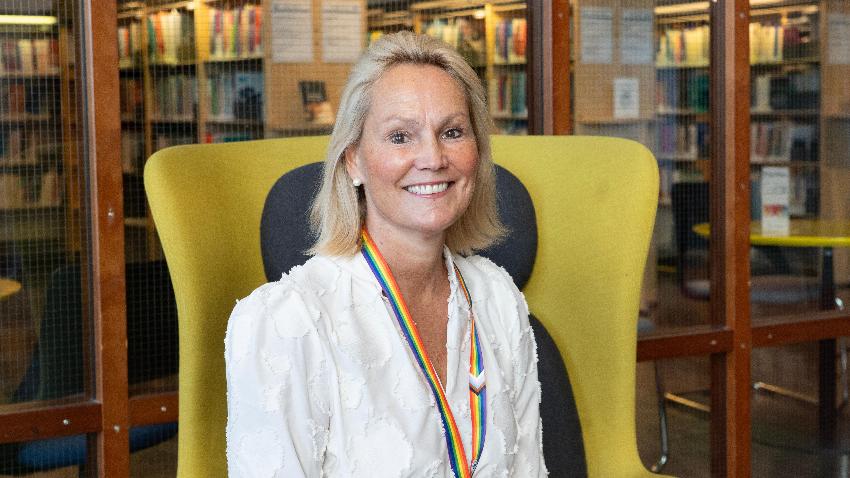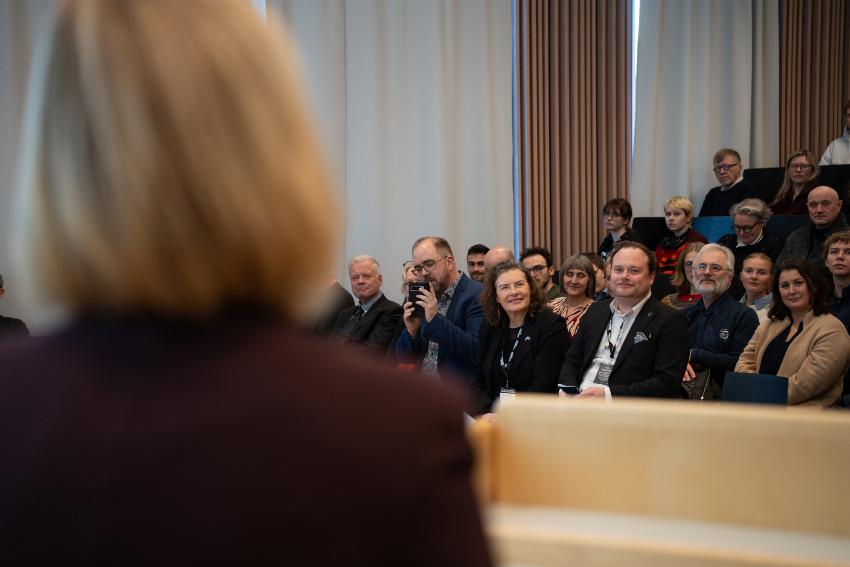A potential for boundary commissions and regional cooperation in West-Africa
Effie Sackey is currently researching on the efficiency of boundary commissions under supervision from NCLOS. She believes such agencies could be key in settling maritime boundary disputes in West-Africa.
In West-Africa, the political climate is such that I think it’s important for West-African nations to establish boundary commissions to help settle disputes so there’s peace and development through cooperation and collaboration.
Effie Sackey is the Head of Legal at the Ghana Boundary Commission. She has been a UN Nippon fellow for almost 9 months now and is currently in the stage of finalizing a research paper about the operational efficiency of boundary commissions. Having experience from negotiation processes in the legal settling of land and maritime boundary disputes within the West-African region, Sackey was interested in learning more about the status of boundary commissions more broadly. Through the UN Nippon Foundation Capacity-Building Programme, she researches on this topic at UiT The Arctic University in Norway. An experience she says has been life-changing, and an important undertaking in terms of capacity-building between nation states.
From her work with Ghana’s Boundary Commission, Sackey is already well-acquainted with disputes around land boundary demarcation and maritime boundary delimitation. Yet, she wanted to know more about how the operationalization of the type of agency she represents are articulated within international legal agreements, like UNCLOS (the UN Convention on the Law of the Sea), and how effective they are. Her keen interest in developing regional cooperation and understanding around this topic in West-Africa motivated her to apply for the UNNF Capacity-Building Programme.
- I got really interested in this, so I thought let me apply for this. I applied and I got it, and I was so happy, because it’s very competitive. You have thousands of applications, she says.
Disputes in the aftermath of colonialism
As the Head of Legal at the Ghana Boundary Commission, she does a varied and extensive type of work. The mandate and duties of the Ghana Boundary Commission are to delimit and demarcate the country’s land and maritime boundaries with its neighbours. This is essential to protect Ghana’s sovereignty, Sackey says. For Ghana, this entails establishing constructive cooperation with Togo, Burkina Faso, Côte d’Ivoire, as well as Nigeria whom they share maritime space with.
The ongoing disputes today in West-Africa over the legal governance of resources and territories are the aftermath of the region’s colonial history. Sackey explains that the colonial governments demarcated states haphazardly and did not delimit maritime areas.
- The demarcation was done so badly. The reason why we have a lot of issues concerning land and maritime boundary disputes, are because of the way the land boundaries were demarcated. So, it is really necessary for states and West-African states especially, to delimit their maritime boundaries with their neighbours so everybody knows where their territory begins and ends.
The need to demarcate land boundaries and delimit maritime boundaries
At UiT, Sackey receives supervision and support from the scientific staff at the Norwegian Centre for the Law of the Sea (NCLOS). Her research paper investigates maritime boundary delimitation in West Africa and how boundary commissions have worked in delimiting maritie boundaries. Her research also looks at countries that do not have boundary commissions and how they manage disputes around maritime boundaries.
What are some of your findings that you would highlight?
- A lot of countries that haven’t delimited their maritime boundaries are really going through so much which could have been solved if they had delimited their maritime boundaries, or if they had boundary commissions that were facilitating this work. If they had delimited their maritime boundaries with their neighbours, and also in an amicable manner, then they perhaps could have some sort of joint collaboration to really manage the boundaries. Sometimes you can even decide to share the resources. A lot of times disputes are over resources, so you can decide to share with your neighbours.
As an example, Sackey looks at the situation for Guinea and Sierra Leone and in relation to the Gulf of Guinea. “Unfortunately, the Gulf of Guinea has become a hub for pirates and pirate activity, and transnational crimes”, she says. The challenge in this region now is not only to determine where the maritime boundaries ought to be and how the natural resources could be divided and shared between state actors. It is also about fighting highly complex criminal networks that surpasses any one country’s territorial jurisdiction in the region. The Gulf of Guinea is in a managerial crisis one can say. Yet, the reality could potentially have been and still be very different, according to Sackey. She says that countries within the Gulf of Guinea could have joint patrols and find ways to share the natural resources in an equitable manner. “It is so much they can together as opposed to just fight against each other. It is better to establish a boundary commission when dealing with all these issues, to facilitate the settlement of disputes, maritime boundary delimitation and cooperation ”, she explains.
The Gulf of Guinea is an exceptionally challenging area to control as it is a strategic area in many respects, from international oceanic traffic to the plenitude of important seaports to containing lucrative minerals and natural resources like oil, gas and fish. Still, Sackey says cooperation through agencies like boundary commissions would be a positive way to go in terms of facilitating and enabling transatlantic collaboration within the maritime space. This potential, she says, is however dependent upon national and regional stability, and each state’s desire to resolve regional disputes in relation to land boundary demarcation and maritime boundary delimitation.
- Some countries have joint boundary commissions, or they work with their neighbours, and it works out fine. Not every country needs a national boundary commission , it depends on their relationships with their neighbours, and what is happening politically. In West-Africa, the political climate is such that I think it’s important for West-African nations to establish boundary commissions to help settle disputes so there’s peace and development through cooperation and collaboration.
Development of West-African cooperation
Sackey has herself partaken in negotiations between Ghana and Togo in disputes about land and maritime boundaries and met with “a potpourri of experts” as she calls it, from lawyers to geologists, all with significant and multifaceted understandings about demarcation and delimitation. She stresses how climate change, illegal fishing and overexploitation of the natural resources in the maritime space are challenges that they regionally struggle to deal with. Affirming land and maritime boundaries are in this regard also important in order to secure and control the maritime activities that are taking place in the region now.
Has Ghana managed to delimit its maritime boundaries yet, or is it still an ongoing process?
- We delimited our maritime boundaries with Côte d’Ivoire, and we are in talks with Togo. We’ve done all the legwork for Togo, but it looks like there are some negotiations going on, and our delimitation with Togo will also affect the delimitation with Benin and Nigeria. We have started meeting with them also so that we can discuss how things should go when the delimitation is done so that we have good relationships with our maritime neighbours. So, it is still an ongoing process that takes years. I thought we would sit and negotiate for a couple of years, but then we started to negotiate with Togo in 2018, and we are still negotiating.
Sackey is positive about the future for interregional cooperation in West-Africa and in the development of boundary commissions. She explains how countries in the region already organize meetings and workshops where they share experiences and knowledge about how to manage and settle disagreements about maritime and land boundaries. They also incorporate provisions from the UN Convention on the Law of the Sea. “It is very detailed and gives you the guidelines on what do to and how to do it”, she says. Yet, she also emphasizes that there are challenges that have the capacity to stall the further development of boundary commissions in West-Africa. The main one, she says, is political will, or the lack of it, in which funding and limited resources are central issues that need to be prioritised.
Life-changing opportunity
How would you reflect on this journey, from the stage of applying, to going to New York, to come all the way to Tromsø and do research?
- The experience has been life-changing, and so memorable. I will never forget this time of my life. One day I was sitting at home in the sun, and the next moment I somewhere where it’s minus six degrees. But is has been very exciting, very impactful and educative. I love Tromsø, it is a very nice place, very serene, and peaceful.
She praises the safety of the city and the campus. She is also very content with the program and the academic support that she has been given from her colleagues at NCLOS. “This is going a long way in terms of capacity-building in my commission”, she says. In terms of the research that she has been conducting, she hopes that it will have an impact on further development of land and maritime negotiations. Nonetheless, she says the experience has all in all been wonderful and she that is left with valuable insights and memories. “It’s been a process of growth, socially, personally and careerwise”, she concludes.
Kortnytt fra Det juridiske fakultet


